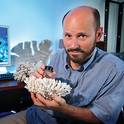- Oxbow lake,
- Macrophytes,
- Sediment,
- Decomposition,
- Terrestrialization
Ecological alterations of wetlands due to anthropogenic influence are a central topic of discussions focussing on the restoration of these disturbed ecosystems. In this context we investigated the role of macrophytes in the terrestrialization process of an oxbow lake of the river Danube, where a thick sediment layer has developed since river regulation. One third of the oxbow lake is covered by a reed belt, fuelling about 140 tons of plant material per year into the detritus pool. From submerged macrophytes the system receives about 48 tons. Degradation of emergent macrophytes is slow due to early burial by sediment, leading quickly to anaerobic conditions. Thus emergent macrophytes contribute significantly to the terrestrialization process. The fast decomposition of submerged macrophytes indicates a low contribution to the terrestrialization process.
Available at: http://works.bepress.com/bernhard-riegl/58/

©WILEY-VCH Verlag Berlin GmbH